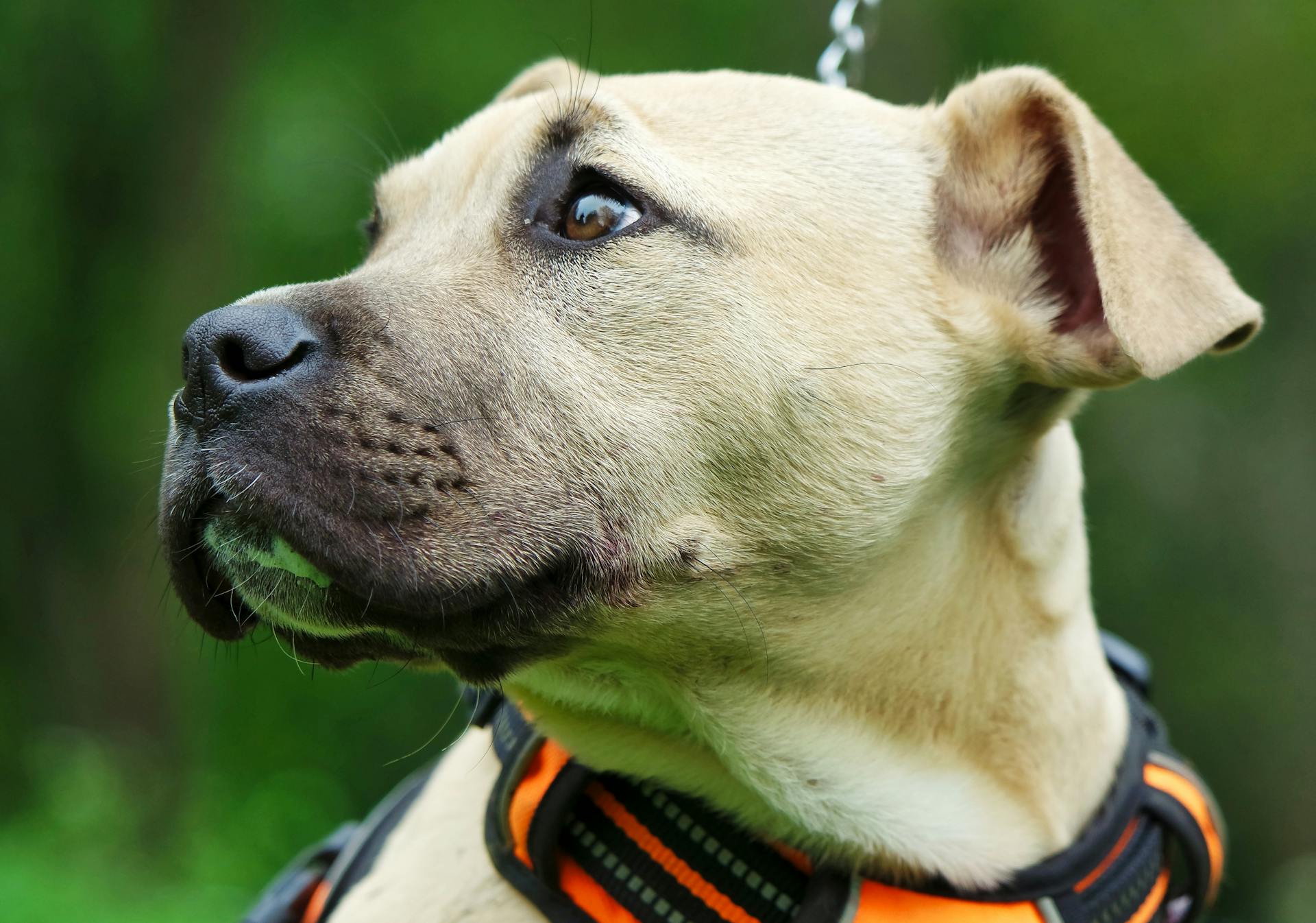
Maryland has a law that prohibits the ownership of pit bulls in Baltimore City, with some exceptions for service animals and police dogs.
In Denver, Colorado, pit bulls are banned from being owned as pets, but can be kept as service animals or with special permits.
Ohio has a law that restricts the ownership of pit bulls in several cities, including Cleveland and Cincinnati, with requirements for liability insurance and spaying/neutering.
These laws vary by state and even by city, so it's essential to check local regulations before bringing a pit bull into your home.
Breed-Specific Laws
Breed-Specific Laws have been implemented in various forms across the United States. Some municipalities outright ban certain breeds, like Council Bluffs, Iowa, which prohibits residents from owning American Pit Bull Terriers.
These laws can also include additional requirements for owners of specific breeds, such as Des Moines, Iowa, which mandates that pit bull owners buy insurance that pays at least $100,000 to cover injuries or property damage caused by their dogs.
Recommended read: Laws on Pit Bulls in California
Mandatory sterilization is another common example, as seen in Kansas City, Missouri, where owners of certain breeds are required to sterilize their dogs. However, there are often exceptions to these general rules, such as a veterinarian's confirmation that the procedure would harm the animal.
Dog owners have challenged these ordinances in court, and while some have been thrown out, courts generally uphold laws that impose special restrictions on certain breeds or ban them outright. The Ohio and Kansas state supreme courts have upheld ordinances regulating the ownership of pit bulls, and the United States Supreme Court has rejected requests to review these state court decisions.
Opponents of Breed-Specific Laws argue that they are unconstitutionally vague, as they often don't define "pit bull" sufficiently. However, most courts don't require much in the way of specifics, and some have even stated that behavioral and physical characteristics set out in the law are enough to put a dog owner on notice.
Some states, like South Carolina and Colorado, have mixed-preemption and home rule laws that allow city and county breed-specific spay and neuter ordinances. In Colorado, home rule cities and counties can supersede and mute state-level laws prohibiting local breed-specific ordinances.
A unique perspective: How Often Do Pit Bulls Attack
Here are some states governed by mixed-preemption laws and home rule:
Why BSL is Passed
BSL is passed in response to a dog bite in the community, a knee-jerk reaction fueled by a desire to improve public safety.
Legislation is often based on fear, rather than evidence. One study found that the popularity of breed-discriminatory laws is largely based on fear.
A case in point is Prince George's County, Maryland, where BDL was enacted in response to a dog bite, but failed to address the underlying issue.
Check this out: Pitbull Terrier Banned
Impact of BSL
The impact of Breed-Specific Legislation (BSL) on communities is a complex issue. BSL, which includes laws that ban or restrict certain breeds like pit bulls, has been implemented in many states.
Pit bulls are often at the center of BSL debates, with some arguing that the breed is inherently aggressive.
In Colorado, for example, a law passed in 2005 banned pit bulls, but was later repealed in 2012 after a study found that the breed was not inherently more aggressive than other breeds.
Check this out: Pitbull Breed Ban
The repeal of the Colorado law led to a significant decrease in the number of pit bulls euthanized in shelters, with some shelters reporting a 40% decrease in euthanizations.
In some states, BSL has led to an increase in dog bites and attacks, as people may be more likely to keep aggressive dogs in secret.
In contrast, other states have seen a decrease in dog bites and attacks after implementing BSL, although the effectiveness of BSL in preventing bites is still a topic of debate.
A study in California found that dog bites increased by 14% in areas where pit bulls were banned, suggesting that BSL may not be an effective solution to preventing dog bites.
On the other hand, a study in Florida found that dog bites decreased by 21% in areas where pit bulls were restricted, suggesting that BSL may have some benefits.
Ultimately, the impact of BSL on communities is still a matter of debate, with different studies and experts presenting conflicting evidence.
Expand your knowledge: Female Pitbull Dog
BDL Explained
Breed-discriminatory legislation (BDL) is any law or policy that prohibits or places restrictions on individual dogs because of their supposed breed.
Different breeds have been targeted over time, including German Shepherds and Dobermans.
BDL actually refers to legislation that prohibits any dog breed, not just pit bull terriers.
In some cases, laws don't outright ban pit bull terriers but create de facto bans through restrictions like expensive insurance policies or mandatory muzzling.
These tough restrictions often force owners to give up their family pets.
Pit bull terriers are often the target of BDL, so if you hear about BDL in the news, it's likely about them.
The term "pit bull ban" is sometimes used to describe BDL, but it's a bit misleading since BDL targets any breed.
Suggestion: What Breed of Pit Bulls Is the Biggest
States and Preemption
California, South Carolina, and Colorado are examples of states with mixed-preemption and home rule laws that allow for local breed-specific ordinances. California allows cities and counties to enact breed-specific ordinances for mandatory spay or neuter programs and breeding requirements.
The state of Colorado has strong home rule provisions, which means that home rule cities and counties can supersede state-level laws and enact their own breed-specific ordinances. This is why the City and County of Denver can have its own breed-specific laws.
South Carolina's law, adopted in 1988, states that an animal is not considered a "dangerous animal" solely by virtue of its breed or species. This law is specific to the regulation of "dangerous dogs."
Here are the states mentioned, along with their relevant laws:
Public Perception and Court Opinions
Many people view pit bulls as aggressive and unpredictable, which contributes to the breed being banned in several states. This public perception is often fueled by high-profile attacks and media coverage.
In 2007, a court in Miami-Dade County, Florida, upheld a ban on pit bulls, citing the breed's "inherent dangers."
Organizations Oppose BDL
Many organizations have spoken out against Breed-Discriminatory Legislation (BDL).
The Centers for Disease Control and the American Bar Association (ABA) are two notable groups that oppose BDL. The ABA passed a resolution in 2012 urging local legislative bodies to adopt breed-neutral laws.
The National Animal Control Association (NACA) also opposes BDL. The Obama Administration was another group that opposed BDL due to the overwhelming evidence against it.
A fact sheet by the Animal Farm Foundation lists many organizations that do not endorse BDL.
The Name Game
The term "pit bull" is a generic name that refers to a small variety of dogs, including the American Pit Bull Terrier, Staffordshire Terrier, and others.
These dogs are part of a larger terrier breed group and are not recognized as a single breed by organizations like the American Kennel Club (AKC) or the United Kennel Club (UKC).
The AKC registers the Staffordshire bull terrier and the American Staffordshire terrier, but not a "pit bull" breed or group.
Related reading: Pit Bull American Terrier
Similarly, the UKC registers the Staffordshire bull terrier and the American Pit Bull terrier, but not a "pit bull" breed or group.
The term "pit bull" is often used to describe a subgroup of dogs that are characterized by common phenotype, origin, or traditional use.
In some cases, the term "pit bull" is used interchangeably with other breed names, such as Staffordshire terrier.
Worth a look: Pit Bull vs Pit Bull Terrier
Court Opinions on Dangerousness
Court opinions on dangerousness often focus on a person's likelihood of committing a future crime. In the case of Tarasoff v. Regents of the University of California, the court ruled that therapists have a duty to protect third parties from harm.
A person's history of violent behavior is a key factor in determining their level of dangerousness. The case of People v. Dlugash highlighted the importance of considering a defendant's past actions when assessing their potential for future harm.
Courts may also consider a person's mental state when evaluating their dangerousness. In the case of Durham v. United States, the court established the "product test", which holds that a person is not criminally responsible if their actions were the result of a mental disease or defect.
A person's ability to conform to societal norms can also be a factor in determining their level of dangerousness. The case of Pate v. Robinson established that a person's mental capacity can be a mitigating factor in determining their guilt or innocence.
Related reading: When Do Pit Bulls Go into Heat
Frequently Asked Questions
Are pit bulls banned in Texas?
No, pit bulls are not banned in Texas due to state law. However, local jurisdictions may have specific regulations and restrictions on pit bulls and other breeds.
Sources
- https://petset.com/what-states-dont-allow-pit-bulls/
- https://www.nolo.com/legal-encyclopedia/free-books/dog-book/chapter12-4.html
- https://www.forallanimals.org/pit-bull-terriers-breed-discriminatory-legislation-faqs/
- https://www.dogsbite.org/legislating-dangerous-dogs-state-preemption-map.php
- https://www.dogbitelaw.com/pit-bulls/
Featured Images: pexels.com


